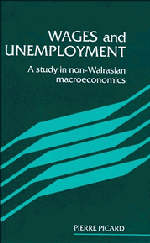Book contents
- Frontmatter
- Contents
- Acknowledgements
- Introduction
- 1 Price rigidities and temporary equilibrium
- 2 Wage rigidity and short-run macroeconomic equilibrium
- 3 Real wages and the inflation—unemployment dilemma
- 4 External constraint, oil shock and economic policy
- 5 Implicit contracts and unions
- 6 Introduction to efficiency wage models
- 7 Efficiency wages, employment fluctuations and fiscal policy
- 8 Labour market dualism, efficiency wages and optimal taxation
- Notes
- References
- Author index
- Subject index
- Frontmatter
- Contents
- Acknowledgements
- Introduction
- 1 Price rigidities and temporary equilibrium
- 2 Wage rigidity and short-run macroeconomic equilibrium
- 3 Real wages and the inflation—unemployment dilemma
- 4 External constraint, oil shock and economic policy
- 5 Implicit contracts and unions
- 6 Introduction to efficiency wage models
- 7 Efficiency wages, employment fluctuations and fiscal policy
- 8 Labour market dualism, efficiency wages and optimal taxation
- Notes
- References
- Author index
- Subject index
Summary
When either addressing the issue of fluctuations in output and employment, or explaining long-term inefficiencies of market economies, macroeconomic theory frequently places the determination of wages at the heart of the matter. Indeed, new classical and neo-Keynesian approaches to economic fluctuations basically differ in the sense that the first, true to the Walrasian tradition, assumes the perfect flexibility of prices and wages, while the second hypothesizes nominal rigidities. On the labour market, nominal wage rigidity, which the Keynesian approach assumes, may for instance result from long-term contracts providing for wages that are insensitive to monetary and real shocks, because frequent negotiations or wage-setting are costly and detailed contingent contracts are unfeasible. When applied to all markets, the Keynesian approach leads to contemplating nominal rigidities which affect all money prices and wages, and are likely to account for the kind of disequilibria an economy might encounter in the short run. However, the mere existence of high and long-lasting unemployment, especially in European economies since the early 1970s, has shown that labour market disequilibrium, revealed through job queues, layoffs, dual labour markets or discrimination among workers, must also be contemplated in the long run, with constraints affecting real rather than nominal wages.
Whether rigidities are nominal or real, assuming that wages are not determined by supply equalling demand on the labour market, leads to the substitution of other equilibrium concepts for the usual definition of the Walrasian general equilibrium model.
- Type
- Chapter
- Information
- Wages and UnemploymentA Study in Non-Walrasian Macroeconomics, pp. 1 - 5Publisher: Cambridge University PressPrint publication year: 1993



